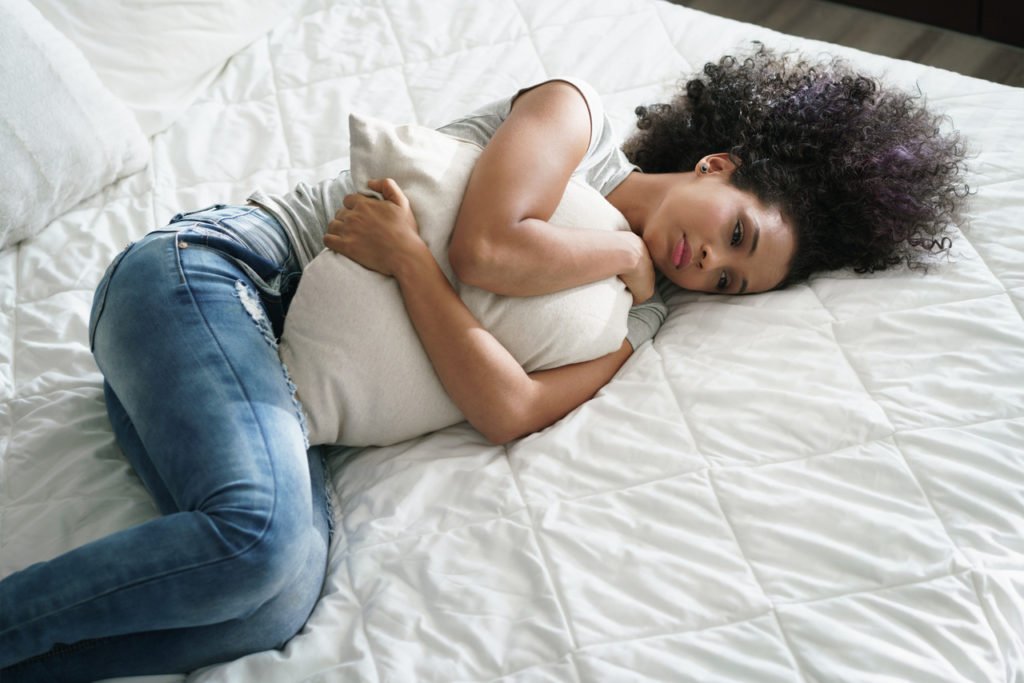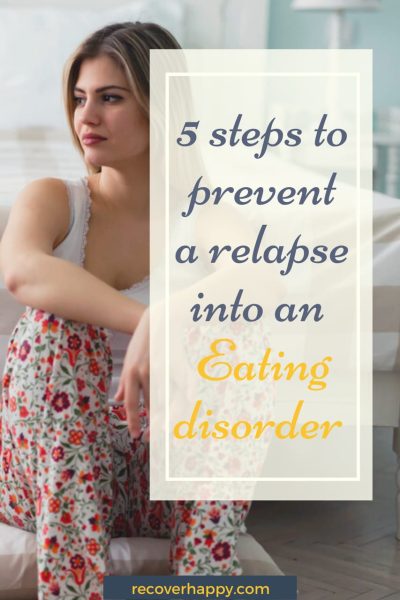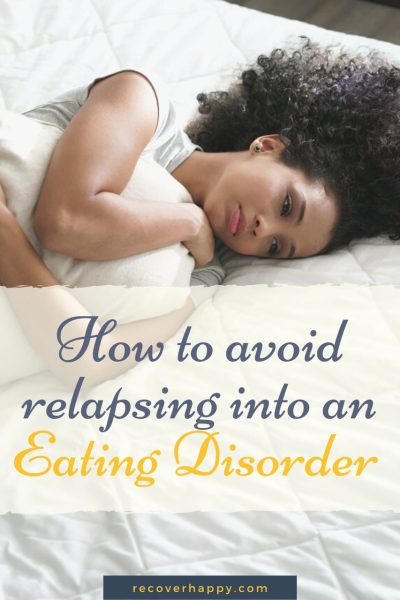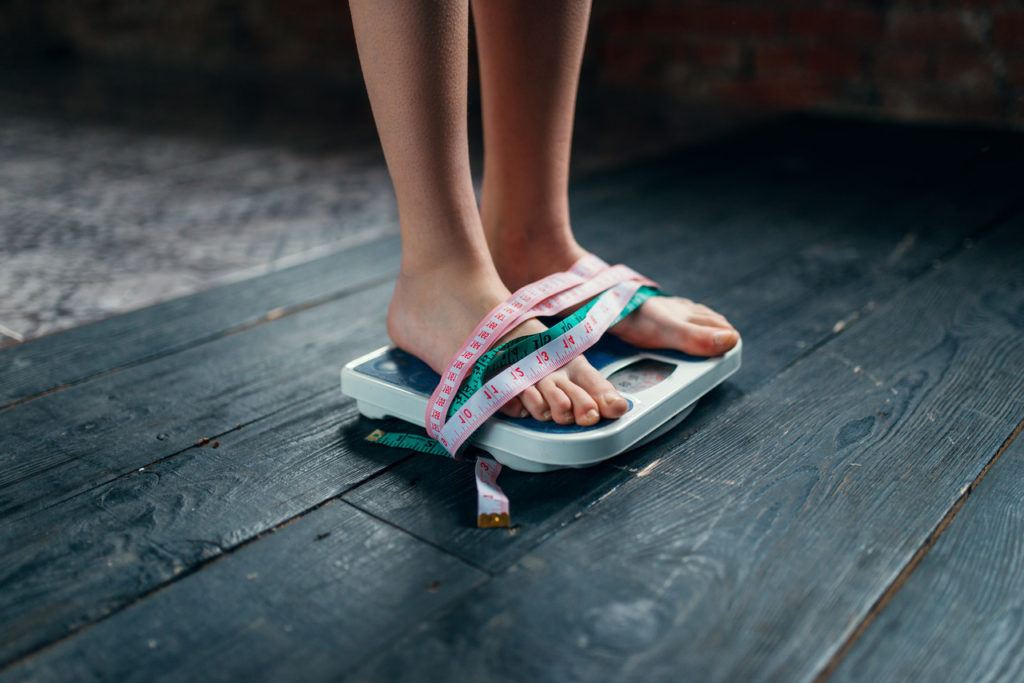How to avoid relapsing into an eating disorder
By Tanja, Psychologist for Eating Disorders & Body Image

“Rather than viewing a brief relapse back to inactivity as a failure, treat it as a challenge and try to get back on track as soon as possible.” Jimmy Connors

Hi there!
I’m Tanja. I’m a qualified psychologist specialising in eating disorders, negative body image and body hate. I’m also a survivor of anorexia.
My mission is to help you to end your lifelong struggles with food and your body and inspire you to uncover and embrace you true worth. Read more…
Healing from an eating disorder is a different journey for everyone and anything but linear. It can be bumpy with ups and downs and many experience a relapse in eating disorder recovery.
I know that a relapse in eating disorder recovery can be quite demoralising and can make you feel like you are failing or that all your efforts have been in vain. But it is far from that and you are not alone! A relapse in eating disorder recovery is a normal part of a recovery journey and can strengthen your will to continue.
While I was recovering from anorexia, I experienced several relapses. I remember how devastated, frustrated and sad I felt. In retrospect, my relapses weren’t as negative as I thought at the time. Indeed, the relapses were helpful because they strengthened my will to recover fully. Every time I decided to move on and fight for a life without anorexia, I showed my eating disorder how resilient I was despite all the negative thoughts and feelings within me.
Join the Body Acceptance & Food Freedom Collective
Receive a weekly dose of inspirations to help you make peace with your body and food.
Don’t worry, we hate spam too. You can unsubscribe any time.
Categories
Anorexia
Binge Eating Disorder
Bulimia
Intuitive Eating
Mindfulness
Orthorexia
Strategies for Recovery
What does a relapse in eating disorder recovery look like?
What exactly is a relapse? A relapse in eating disorder recovery is a longer period of time in which a person deviates away from recovery and falls back into eating- disordered thoughts, feelings and behaviours.
Not every relapse is the same. Each relapse varies according to one’s stage in the recovery journey and one’s behaviours, thoughts and feelings. There are many things that can trigger a relapse in eating disorder recovery, such as:
- experiencing unusual stress;
- spending time with a very thin person;
- gaining some weight and wanting to lose it again;
- being surrounded by people who are planing to start or have just started a restrictive diet;
- starting to use fitness/activity apps;
- starting to exercise after a long period of inactive;
Of course, the triggers can vary and one person might feel triggered, while another person might not.
Being triggered doesn’t mean you will relapse right away. You might only struggle for a few days and then get yourself back on your eating disorder recovery journey. However, if your struggles last longer than 1-2 weeks, it is good to watch out for behavioural, mental and emotional warning signs of a relapse in eating disorder recovery, such as:
- Starting to lie to those around you and yourself about your eating habits and exercise activists;
- Feeling guilty, sad or depressed when you realise you have eaten “too much” or haven’t done enough exercise;
- Isolating yourself;
- Going back to your old eating disorder rules and patterns;
- Increasing the amount of exercise you do;
- Skipping meals;
- Worrying about your weight;
- Weighing yourself daily;
- Looking at yourself in the mirror frequently;
- Feeling the need to have your eating habits under full control;

How to prevent a relapse in eating disorder recovery
To prevent a relapse in eating disorder recovery, it can be helpful to do the following things:
1. Reach out for support
Having someone who loves, supports and encourages you is a crucial part of your recovery and can be extremely powerful, especially if you are facing a difficult situation. You could try to identify a friend or family member (if this feels safe to you), who will be there for you when you begin to struggle or panic. Tell them what your worries are and ask them if you can lean on them when dealing with fears and challenges.
If you don’t feel comfortable letting people know that you are in recovery, you could look for online support or communities. Remember there are a lot of people who are facing similar issues and just sharing your experiences with others can give you a lot of strength in facing challenging circumstances.
2. Note down your triggers
Try to identify and write down anything that could lead you to return to your disordered eating behaviours, thoughts and feelings. Such triggers could include situations such as upsetting or traumatic events; emotions like stress, loneliness, depression an anxiety; and certain times of the year like beach holidays or Christmas. When you write down your triggers, you may feel more in control and better prepared for situations that could provoke a relapse in eating disorder recovery.
3. Create healthy coping strategies
After you have written down the triggers that could cause you to fall back into your eating disorder behaviours, thoughts and feelings, it is important to create a plan to deal with each of these triggers in a healthier way. Your coping strategies could include writing in a journal, using affirmations, talking to a friend or going for a walk in nature. But it could also include other self-care activities such as getting enough sleep, eating snacks and meals regularly, drawing, mediating, listening to music or learning more about intuitive eating. No matter how good your coping skills are, continue to work on them, as they can help you deal successfully with triggers without going back to your eating disorder.

4. Ban negative influences
Identify the negative influences in your life and find ways to avoid them. These influences could include family members, friends or colleges who are dissatisfied with their bodies and make unhelpful comments about their appearance.
Also, choose the people you follow on social media carefully and the articles you read wisely. Focus on articles and people that don’t focus on diets, clothes and other body-related matters. Avoid messages that trigger competitive or comparative thoughts around weight and body shape.
5. Remember how much you have already achieved and stay positive
Preventing a relapse in eating disorder recovery is also about reminding yourself of your progress; where you have come from and how much you have already achieved. I know that healing from an eating disorder can be a very long journey and demotivating, especially when you can’t see yourself where you would like to be.
Remember all the victories you have already achieved. These victories could include identifying your triggers, eating more regularly, increasing your food selection or overcoming your urge to binge. All these achievements will help you to stay positive and motivated. They will strengthen your resolve to bounce back, when everything inside you is trying to push you back into your eating disorder.
Keep in mind that a relapse in eating disorder recovery is a fairly normal part of the healing process and it does not mean that you have failed. This is nothing to be ashamed of. Just be aware of and be prepared for the possibility of a relapse in eating disorder recovery. With the right approach and attitude you can avoid relapsing and stay on your eating disorder recovery journey.
You don’t need to struggle alone on your recovery journey.
Simply get in touch to discuss how I can help you.
It is entirely possible to overcome an eating disorder or body hate –
I have done it, others have done it and so can you!
Join the Body Acceptance & Food Freedom Collective
Receive a weekly dose of inspirations to help you make peace with your body and food.
Don’t worry, we hate spam too. You can unsubscribe any time.
You Might Also Enjoy...

Hi there!
I’m Tanja. I’m a qualified psychologist specialising in eating disorders, negative body image and body hate. I’m also a survivor of anorexia.
My mission is to help you to end your lifelong struggles with food and your body and inspire you to uncover and embrace you true worth. Read more…



